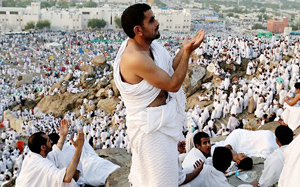Jeddah, Oct 2: More than two million pilgrims have begun marching to Mina on the first leg of their journey of a lifetime.
The government’s agencies have made elaborate arrangements to ensure the smooth flow of pilgrims from Makkah, Madinah, Jeddah, Riyadh, Taif and Dammam into the tent city. The pilgrims will spend the day and night in prayers and then head to the plains of Arafat on Friday morning. The standing at Arafat is the high point of Haj.
In Mina on Wednesday, thousands of young men employed by Haj operators and pilgrim establishments were preparing to receive pilgrims. Traffic police, Civil Defense personnel, Haj Ministry officials, doctors, nurses, paramedics and media personnel were already in the tent city ahead of the pilgrims.
Makkah was bustling with spiritual activity on Wednesday evening. Male pilgrims will don the ihram, two pieces of white seamless cloth that is mandatory before undertaking the journey on Thursday. The ihram for women is different.
“We are excited and happy and also a little nervous,” said Maulana Minhaj Akram, 69, a pilgrim from Khyber Pakhtunkhwa, Pakistan.
He was accompanied by his wheelchair-bound wife, Syeda Majida. “Haj is not easy,” he said via phone from Makkah. “It is physically demanding, but spiritually exhilarating.”
He said they were told by their organizers that they should be ready on Wednesday night. “Our bus is supposed to arrive immediately after Fajr on Thursday,” he said. “We will then head to Mina where we have been allotted a place in one of the many tents.”
Lateef Mohammad Jagirdar from Jaipur, Rajasthan, and his wife Shabana Begum were very happy to be here for Haj.
“We can’t describe our feelings. We have been in the queue for three years. More than 360,000 had applied for Haj this year in India and only 136,000 were lucky to come here. We are among the lucky ones.”
Jagirdar said his relatives and acquaintances have asked them for prayers. “We have a long list of requests. We will beseech Allah from Mina and the plains of Arafat to answer our prayers,” he said. “We have come all the way from such a distant land to seek forgiveness and Allah’s mercy.”
“It is the love for our Prophet (peace be upon him) and our beautiful religion that has brought us to the holy land,” said Jagirdar.
The weather was pleasant on Wednesday and is expected to be moderate on Thursday. A visit by Arab News photographer to the Jamrat Bridge and nearby area was full of pleasant feelings. “Excellent arrangements have been made to ensure a smooth Haj,” said Abdullah Bazuhair from Mina.
In Jeddah, Riyadh and other cities, men and women were seen heading in cars and buses to Makkah to perform Haj. They were chanting “Labbaik Allahuma Labbaik” (O God, here we are answering your call). Onlookers were encouraging and smiling at the pilgrims and asking them to pray for world peace.
Meanwhile, the Interior Ministry’s public security department has stopped 145,354 pilgrims from entering Makkah because they did not have Haj permits.
In a statement issued on Wednesday, the department said that its officers also barred 51,112 cars without entry permits. “The department also arrested the operators of 40 fake Haj service companies and launched investigations against them.”
In a related development, Hail police arrested 482 violators of Haj, labor and residency regulations. The operation was carried out by Hail Police Chief Maj. Gen. Ibrahim Al-Almaei, said Col. Saad Al-Horaish, assistant spokesman of the department. Legal action would take place against the violators, he said.
The interior and Haj ministries have launched a campaign to counter bogus Haj companies offering services for domestic pilgrims. The Interior Ministry said such operators were exploiting ignorant pilgrims, whom they abandon at the holy sites without accommodation and other services.
The ministry said it would severely punish such operators. The perpetrators would have to pay compensation to their victims. If they are expatriates, they would also be deported.
In an unfortunate development, five pilgrims died and eight others were injured when their vehicle was involved in an accident on the Al-Leith-Makkah Road on Tuesday night.
The Saudi Red Crescent took the bodies and the injured to King Abdul Aziz Hospital in Jeddah. Some of the injured sustained deep wounds.
All the pilgrims, including two women, were reportedly not carrying Haj permits. The accident took place while the driver was taking them through a desert road to evade the police. An online publication identified the injured as Sudanese and Eritrean nationals.





Comments
Add new comment